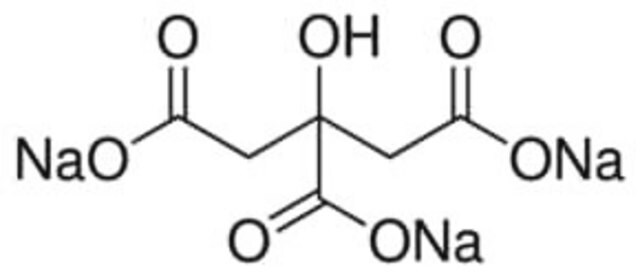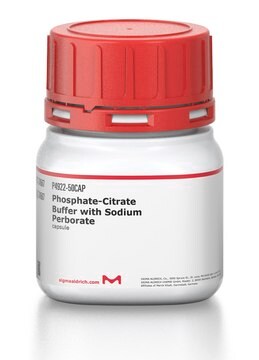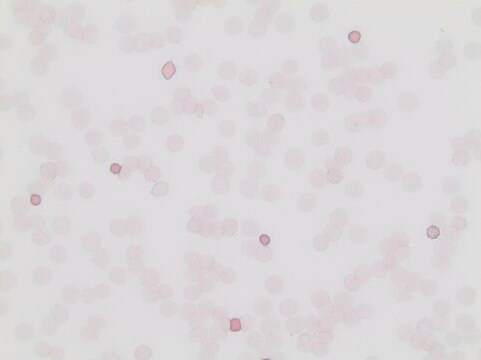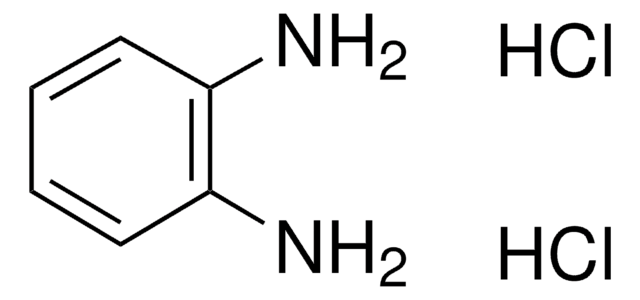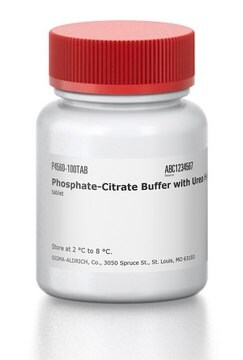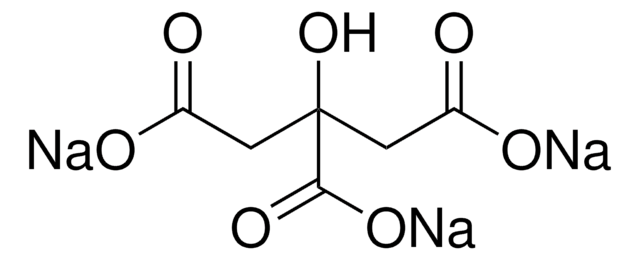P4809
Phosphate-Citrate Buffer
tablet
Synonyme(s) :
PCR Buffer
Se connecterpour consulter vos tarifs contractuels et ceux de votre entreprise/organisme
About This Item
Code UNSPSC :
12161700
Nomenclature NACRES :
NA.25
Produits recommandés
Forme
tablet
pH
4.5-5.5 (1 tablet/100mL in water)
Solubilité
water: soluble
Température de stockage
room temp
Description générale
Phosphate-citrate buffer is a common buffer used along with soluble horseradish peroxidase substrates such as o-phenylenediaminedihydrochloride (OPD) or tetramethylbenzidine (TMB). It gives a pH of 5.0 with an excellent buffering capacity. The phosphate-citrate buffer tablets can be used to prepare a 0.05 M phosphate-citrate, pH 5.0, buffer solution. These tablets elicit a fast, convenient, and accurate method for the synthesis of phosphate citrate buffer solutions. They remove the time-consuming and tedious process of weighing individual components in buffer preparation. Phosphate-citrate buffer tablets have been manufactured from the highest quality components to exacting physical and chemical specifications to ensure performance and lot-to-lot consistency. Phosphate-Citrate Buffer tablets, pH 5.0, have been formulated as a substrate buffer in immunoassay procedures.
Application
- Characterization of nettle leaves (Urtica dioica) as a novel source of protease for clotting dromedary milk by non-destructive methods.: This study uses phosphate-citrate buffer in the enzymatic extraction processes to maintain stability and activity of plant-derived enzymes, demonstrating its crucial role in the development of natural coagulants for dairy products (Bouazizi et al., 2022).
- A rapid, low pH, nutrient stress, assay to determine the bactericidal activity of compounds against non-replicating Mycobacterium tuberculosis.: Utilizing phosphate-citrate buffer, this study develops a low pH nutrient stress assay for evaluating the efficacy of antibacterial agents against dormant tuberculosis bacteria, providing a critical tool for drug development (Early et al., 2019).
- Measurement of Free Iodine in Different Formulations of Povidone-Iodine Eye Drops 5.: This investigation uses phosphate-citrate buffer to measure the stability and release of iodine in ophthalmic solutions, highlighting its importance in ensuring the efficacy and safety of eye care products (Prado et al., 2019).
Reconstitution
One tablet dissolved in 100 mL deionized water yields a 0.05 M phosphate-citrate buffer, pH 5.0, at 25 °C. Store at room temperature.
Mention d'avertissement
Warning
Mentions de danger
Conseils de prudence
Classification des risques
Eye Irrit. 2 - STOT SE 3
Organes cibles
Respiratory system
Code de la classe de stockage
11 - Combustible Solids
Classe de danger pour l'eau (WGK)
WGK 3
Point d'éclair (°F)
Not applicable
Point d'éclair (°C)
Not applicable
Certificats d'analyse (COA)
Recherchez un Certificats d'analyse (COA) en saisissant le numéro de lot du produit. Les numéros de lot figurent sur l'étiquette du produit après les mots "Lot" ou "Batch".
Déjà en possession de ce produit ?
Retrouvez la documentation relative aux produits que vous avez récemment achetés dans la Bibliothèque de documents.
Les clients ont également consulté
Rose, N., et al.
Manual of Clinical Laboratory Immunology, 106-106 (1986)
In vivo experimental model of orthotopic dental pulp regeneration under the influence of photobiomodulation therapy.
Maria Stella Moreira et al.
Journal of photochemistry and photobiology. B, Biology, 166, 180-186 (2016-12-09)
Antonino Tuttolomondo et al.
Oncotarget, 8(37), 61415-61424 (2017-10-06)
Anderson-Fabry disease (AFD) is an inborn lysosomal enzymopathy resulting from the deficient or absent activity of the lysosomal exogalactohydrolase, α-galactosidase A. This deficiency, results in the altered metabolism of glycosphingolipids which leads to their accumulation in lysosomes, thus to cellular
A S de Mello et al.
Journal of biomedicine & biotechnology, 2011, 132581-132581 (2011-06-11)
The Epstein-Barr virus (EBV) was used as an agent of B lymphocyte proliferation for subsequent diagnosis of lysosomal storage disease. Due to the constant handling of long-preserved samples in our cell bank, we decided to observe the behavior and then
Giuseppe Mangialardi et al.
Diabetologia, 62(7), 1275-1290 (2019-04-20)
Previous studies have shown that diabetes mellitus destabilises the integrity of the microvasculature in different organs by damaging the interaction between pericytes and endothelial cells. In bone marrow, pericytes exert trophic functions on endothelial cells and haematopoietic cells through paracrine
Notre équipe de scientifiques dispose d'une expérience dans tous les secteurs de la recherche, notamment en sciences de la vie, science des matériaux, synthèse chimique, chromatographie, analyse et dans de nombreux autres domaines..
Contacter notre Service technique
